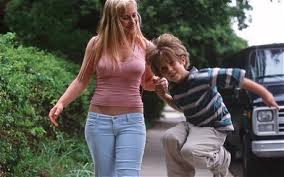Boyhood is that most modern of movies. As self-actualisation in the Western world fast becomes our primary goal, Director Richard Linklater offers up a more innocent take on growing up. It’s real and wonderfully refreshing.
This boy is no internet-hooked, selfie taker. His is a childhood of bikes and hiking, a lo-tech slice of real life. A wide-eyed, silent observer of the world and his family, Mason is so quiet that it comes as a shock when he starts to articulate his own thoughts. When he does speak it is mainly to express his own uncertainty. This is no hip or cynical commentator, rather a boy lost in wonder at the beauty and sadness of the world.
Much has been made of the innovative twelve year shooting period that follows the same young actor, Ellar Coltrane, from age six to eighteen as he grows up. Yet there are other points of difference that mark out this subtle, involving indie drama. Linklater is king of the anti-drama. There are no big events – no murders, no rapes and only a little violence. There are no good guys and no bad guys and – some would argue – not much story either. The film moves us with a series of small but important moments in a family’s life. In the absence of the conventional dramatic climax in a scene, I found myself crying at unexpected moments, during a transitional scene, moved by reminders of my own family.
It is the most relatable of films – in that it takes the standard clichés of the coming of age movie – the ball game, the first love, the graduation, and presents them as fresh and uncontrived. Many scenes were based on improvisation and the closeness of the on-screen family (headed up by the impressive Ethan Hawke and Patricia Arquette) means they rub along in an utterly convincing and authentic way.
This is a world you want to be part of. Linklater’s liberal value system eschews the obvious and embraces contradiction – the educated alcoholic, the decent army guy, the ‘flaky musician’ Dad who seeks out security. This is a loving portrait of America, land of the individual yet also home of the gun and the bible, and he embraces it all with a breadth of vision that takes your breath away.
The scope of Boyhood’s epic time frame recalls older, Hollywood movies like Giant that tell the history of America through one extended clan. Yet Linklater’s natural, real time ‘fly on the wall’ approach also shares its DNA with the ground-breaking British documentary series Seven Up! which revisited the same children every seven years as they grew up and through adulthood.
Time in a movie is a construct. The idea that a movie unfolds over a two hour period and offers up a few moments in time is pure illusion. ‘Boyhood’ challenges this construct and offers up an alternative vision. It also makes you realise how phoney most on-screen attempts at ageing are. The shock and pleasure of seeing people age for real on camera contrasts with Hollywoods’ obsession with our actors (especially women) looking forever young. We all grow up – and we all age – and while countless films have celebrated the joys of coming of age, it is rare to see so many generations reflected in one story with such a light touch.

There is great joy in ‘Boyhood’ and I was reminded many times of my own family while watching it. There is a sense of community we get when we watch a film that reflects our own experience. We should celebrate that.




